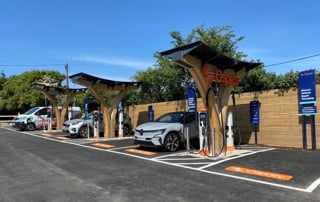Jonny Berry, head of decarbonisation at Hitachi Capital Vehicle Solutions
Despite the Government’s plans to expand the electric vehicle (EV) charging network, with £1.3 billion funding announced last year, workplace charging is becoming another key consideration to further bolster the UK’s EV charging infrastructure and encourage EV adoption.
For commercial fleets, it’s already vital that businesses start to introduce depot and employee charging as part of their decarbonisation strategy, considering around 40% of households have no access to off-street parking to install a home charging point (granted, we don’t know how many of those don’t own or even require a vehicle).
Whilst some company vehicle drivers will not currently consider workplace charging as critical to their current needs, this option is going to become increasingly sought after in years to come, particularly as more and more employees take advantage of extremely attractive benefit in kind (BIK) tax rates associated with electric and hybrid vehicles, as well as recognising the health benefits of zero tailpipe emissions.
Likewise, for businesses, there is no better time to introduce at-work charging.
The current Workplace Charging Scheme is a notable incentive to encourage installation, providing grants of up to £350 per socket at places of work around the UK.
To date, more than 13,000 workplace points have been installed since the scheme’s launch in 2016, with this number expected to rise exponentially in the coming months.
Furthermore, employers are eligible for the 'super deduction', so businesses could get 130% tax relief on the remaining post-grant cost.
However, despite the financial incentives available, the development of workplace charging clearly comes with its complexities, the costs to the business should be carefully considered depending on operational and commercial requirements.
A key aspect to charging infrastructure is ascertaining the intended site charging capacity and any potential grid constraints in ensuring the solution is feasible.
It’s also important for companies to consider the day-to-day operation of their vehicle parking, balancing the charging needs of employees as well as the commercial fleet.
These questions pose multifaceted logistical challenges but are touch points that can be easily overcome using smart solutions.
For example, should companies wish to charge their staff for their fuel, there are back-office solutions that enable businesses to set their kWh price; typically, this would be a reasonable cost by comparison to that of electricity at home.
In addition, these back-office solutions can also manage all the related invoicing and/or receipting.
As EV charging requirements increase over time, allowing for an open configuration hardware/back office enables employers to easily scale up the infrastructure to meet their bespoke future needs.
Hitachi Capital Vehicle Solutions (HCVS) offers a full end-to-end Intelligent Decarbonisation solution.
By managing the entire assessment and infrastructure implementation, based on key operational business objectives, the complexity for fleet operators is reduced, enabling them to have the complete transition handled by one contracting party.
Given the increased uptake of EVs across company vehicle drivers, salary sacrifice and commercial fleets in response to incentives and a growing prevalence of zero emission zones, businesses should offer workplace charging wherever feasible.
Employees will deem workplace charging as an attractive benefit as they seek to ‘top up’ their vehicles whilst spending long periods of time in the office.
As many businesses prepare to re-open, welcoming employees back to reconfigured offices on a full-time, or part-time, basis, changes to the workplace need to extend to EV re-fueling.
Whilst challenges exist and logistical issues need to be considered, the case for businesses to future proof their car parks are ever more important to supporting our global reduction of emissions.
> Interested in comparing electric vehicle data? Check out the Fleet News' EV tool.
> Interested in ensuring the efficient use of EVs. Check out our dedicated editorial sections: Insight & policy | EV news | Charging & infrastructure | Costs & incentives | Benefit-in-kind | EV case studies | EV road tests





















Login to comment
Comments
No comments have been made yet.